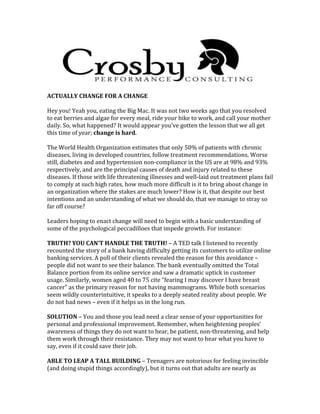
Change Management for Leaders
- 1. ACTUALLY CHANGE FOR A CHANGE<br />Hey you! Yeah you, eating the Big Mac. It was not two weeks ago that you resolved to eat berries and algae for every meal, ride your bike to work, and call your mother daily. So, what happened? It would appear you’ve gotten the lesson that we all get this time of year; change is hard. <br />The World Health Organization estimates that only 50% of patients with chronic diseases, living in developed countries, follow treatment recommendations. Worse still, diabetes and and hypertension non-compliance in the US are at 98% and 93% respectively, and are the principal causes of death and injury related to these diseases. If those with life threatening illnesses and well-laid out treatment plans fail to comply at such high rates, how much more difficult is it to bring about change in an organization where the stakes are much lower? How is it, that despite our best intentions and an understanding of what we should do, that we manage to stray so far off course?<br />Leaders hoping to enact change will need to begin with a basic understanding of some of the psychological peccadilloes that impede growth. For instance:<br />TRUTH? YOU CAN’T HANDLE THE TRUTH! – A TED talk I listened to recently recounted the story of a bank having difficulty getting its customers to utilize online banking services. A poll of their clients revealed the reason for this avoidance – people did not want to see their balance. The bank eventually omitted the Total Balance portion from its online service and saw a dramatic uptick in customer usage. Similarly, women aged 40 to 75 cite “fearing I may discover I have breast cancer” as the primary reason for not having mammograms. While both scenarios seem wildly counterintuitive, it speaks to a deeply seated reality about people. We do not bad news – even if it helps us in the long run.<br />SOLUTION – You and those you lead need a clear sense of your opportunities for personal and professional improvement. Remember, when heightening peoples’ awareness of things they do not want to hear, be patient, non-threatening, and help them work through their resistance. They may not want to hear what you have to say, even if it could save their job. <br />ABLE TO LEAP A TALL BUILDING – Teenagers are notorious for feeling invincible (and doing stupid things accordingly), but it turns out that adults are nearly as susceptible to feeling like Supermen and Wonder Women. When asked to interpret the likelihood that we will experience a negative event like cancer, we are happy to point to “the other guys” as the most likely to be afflicted – even in cases where cancer runs in our family. Conversely, we wish our silly neighbors would stop wasting their money on lottery tickets since winning MegaMillions is our destiny. <br />SOLUTION – Shut the door. Turn off the TV. Introspect. Maybe you’ve been overly optimistic about some things in your professional life for some time now, and it’s hard to blame you considering the most recent economic milieu. However, consistent self-deception is the kind of thing that gets you in trouble when you least expect it. Don’t be the one who “never saw it coming.” <br />I THINK I CAN! I THINK I CAN! – As a child, one of my favorite stories was “The Little Engine that Could.” The underlying them of the “Little Engine” is that a train is stranded and must be pulled over rocky, mountainous terrain. A host of modern, powerful engines refuse the task before a dilapidated blue engine rises to the occasion. The Little Blue Engine, seemingly the least capable of the bunch, is able to complete this task by choo-ing the mantra, “I think I can! I think I can!” all the way over the mountain. In psychobabble, this concept is called “internal locus of control” – which is gobbledygook for the belief that we can act in ways that will influence outcomes. Research has shown that small businesses with internal locus of control CEO’s fail only 7% of the time, as compared to a 45% failure rate for their less self-efficacious counterparts. The human tendency to feel helpless and scapegoat is real – and so is the havoc it wreaks on morale and productivity. <br />SOLUTION – First off, stop blaming the economy. In fact, generate five opportunities or lessons learned from the Great Recession. Maybe you’re a smarter investor. Maybe you’ve spent more time with family. Maybe you’ve gotten insanely wealthy as an outplacement professional. Too many “leaders” blame the environment when times are bad and take credit when times are good. If your actions cannot do anything to positively impact your organization’s plight, you are redundant. <br />Dr. Daniel Crosby is a psychologist, St. Louis Cardinals fan, and President of Crosby Performance Consulting. He is currently perfecting a measure of team type as well as readiness for change in coaching contexts. He’d probably love you forever if you followed him on Twitter @crosbypsych or went to his website http://www.doctordanielcrosby.com/consulting/index.html. <br />
